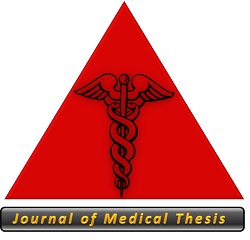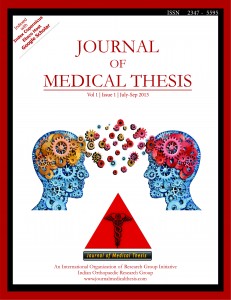JMT Editorial :Statistics in Medical Thesis
Vol 3 | Issue 1 | Jan - Apr 2015 | page:1-2 | Dr. Ashok K Shyam.
Author: Dr. Ashok K Shyam
MS Orthopaedics
Editor - Journal of Medical Thesis
Email: drashokshyam@yahoo.co.uk
Statistics is an essential requirement for all medical thesis, the difference lies in the extent and complexity of the tests. I personally believe thesis should have the most basic statistics and a qualified statistician should be involved in every thesis. As per the scientific purview the hypothesis can only be tested by a proper study design and statistics for an essential aspect of hypothesis testing. Statistician should be involved in the thesis work from the beginning at the time of hypothesis generation. The study design in the hypothesis should contain details of statistics and assessment. Having said that I understand that thesis in medical curriculum [especially in India] is almost the first time that the student is exposed to research and research methodology. For the student to think about statistical part at this point in this thesis is very difficult. I believe the responsibility lies with the thesis guide and the institute to provide a good statistician who can help the students from the start of the thesis.
Also education about basic statistics is very essential for every student of medicine. Many a times it happens that the students simply give the data to the statistician [mostly at the time close to thesis submission date] and ask the statistician to analyse the data and give some 'significant' results. The statistician [who has minimal insight into the subject] simply puts the data in to a software and compares one column to another to generate tables and charts. These charts and tables are then simply inserted into the dissertation and comments are made of things where p value is significant. This leads to over simplification, over complexity or gross misinterpretation and mispresentation of the data. And since the review process of thesis in our country is quite poor, most of the thesis with complex statistical assessment get easily accepted. This can be changed very simply by involving a statistician in the study from the beginning, who can actually sit with the student and guide and understand the study design and hypothesis. Once he understands the subject and the research question it would be easy for him to suggest appropriate statistical test and get a more validate outcome. This small investment of time will make the thesis much stronger on statistical part.
Another advantage of involving a statistician early will be in education of the students. I would personally suggest a lecture series of minimum 4 lectures in study design and statistics to all medical students within 3 months of joining the post-graduation and before they are ready to submit their hypothesis or synopsis. This series should also be attended by the guides and every thesis should be discussed with the statisticians. This will not only help the students design the statistical framework for their study but will also help them understand the statistics used in literature and other journal articles. They will be able to understand the statistical part in the reference articles they read and will be able to point the strength and weakness of the studies in literature. In long run this will help them to make sense of literature throughout their lives and conduct a good appraisal of articles published.
Another advice will be to use only basic statistics and do not complicate the issues for the readers. Keep it Simple will hold the key especially when you intend to convert your thesis into a publication. Also even if you get no significant p value [negative results] do not get discouraged and go in for complex statistics [do not torture the data till it submits]. A study with no significant p value is as important and as valid as a study with significant p value. In fact at times the negative studies have much more clinical impact than the positive ones. To understand this write all results in simple English language. Have a session with your statistician where all numerical results are converted into simple English language sentences. This will help in writing the discussion and also help in understanding and interpreting the results.
So my advice will be to involve a statistician early in your study and keep the statistical methods simple and easy to understand. Get basic statistical knowledge so you can read and appraise literature correctly. We will include some reviews about statistical methods by statisticians in coming issues of Journal of Medical thesis and we hope this will help the students in planning their analysis.
Best Wishes
Dr Ashok Shyam
Editor- JMT.
| How to Cite this Article: Shyam AK. Editorial: Statistics in Medical Thesis. Journal Medical Thesis 2015 Jan - Apr; 3(1):1-2 |
Download Full Text PDF | Download Full Thesis




